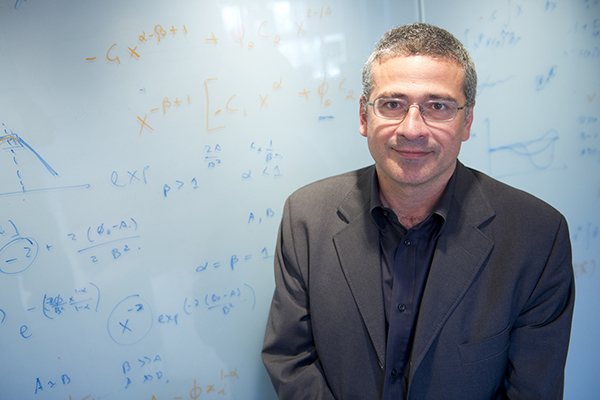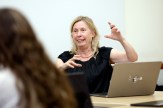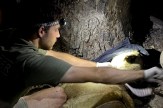Researchers tracking Ebola’s spread win first Aspen Institute Italia Award

Research by Northeastern’s Alessandro Vespignani tracking the spread of the Ebola virus in Liberia in 2014 and the effectiveness of non-pharmaceutical interventions has won the first annual Aspen Institute Italia Award.
The award, which is based on both the quality of the research and the social impact it can have, honors a paper in the theoretical or applied natural sciences resulting from a collaboration between researchers in Italy and the U.S. It comes with a prize of approximately $45,000.
The award is intended to foster the idea of science without borders, science as a global endeavor. Its themes align closely with those of Northeastern.
— Northeastern network scientist Alessandro Vespignani
“The award is intended to foster the idea of science without borders, science as a global endeavor,” says Vespignani, Sternberg Family Distinguished University Professor and director of the Network Science Institute at Northeastern. “Its themes align closely with those of Northeastern: tackling international issues, collaboration on a global scale, the power of worldwide networks, and making communities resilient. I am proud to say that Northeastern was at the center of this international collaborative effort.”

Northeastern professor Alessandro Vespignani, left, and colleagues receive the Aspen Institute Italia Award for their collaborative research on Ebola’s spread in Liberia. Photo by Aspen Institute Italia
The award-winning research was published in the prestigious journal The Lancet Infectious Diseases in February 2015. In addition to Vespignani’s Laboratory for the Modeling of Biological and Socio-Technical Systems at Northeastern, the participating institutions were The Bruno Kessler Foundation and the Institute for Scientific Interchange, both in Italy; the Vaccine and Infectious Disease Division of the Fred Hutchinson Cancer Research Center, in Seattle; and the Department of Biostatistics, College of Public Health, Health Professions, and Emerging Pathogens Institute at the University of Florida.
A long-term collaboration
This wasn’t the first time the researchers had worked together, nor will it be the last. In 2014, PLOS Currents: Outbreaks published research led by Vespignani that assessed the risk of the international spread of Ebola. Lawmakers in the U.S. House of Representatives used a map from the paper during a debate on whether to ban incoming flights from West Africa. This year the journal BMC Medicine published a paper exploring the spread of Ebola in Guinea and its implications for vaccine trials.
“This has become a long-term collaboration among the teams,” says Vespignani.

Alessandro Vespignani, left, Sternberg Family Distinguished University Professor, speaks at the Aspen Institute Italia award ceremony in Rome. Photo by Aspen Institute Italia
For the Lancet paper, the researchers constructed a computational model based on the movements in space and over time of both healthy individuals and those infected with the Ebola virus. It enabled them to estimate not only where, when, and how the virus had spread but also the effectiveness of specific interventions in halting it, such as dedicated treatment units, safe burials, and distribution of protection kits to households. The findings lay the groundwork for developing intervention plans to stem future Ebola outbreaks in West Africa as well as limiting the spread of the disease around the world.
“This is basic research in the new area of computational epidemiology, but at the same time it is what I call actionable science,” says Vespignani. “It’s science that can help provide a picture of the situation on the ground—fill in the gaps about what’s happening in the fog of war that is a disease like Ebola—and help agencies make quick policy decisions.”
The Aspen Institute is an educational and policy studies organization based in Washington, D.C. In addition to the Aspen Institute Italia, in Rome, it has international partners in the Czech Republic, France, Germany, Romania, Spain, India, Japan, and Mexico.





